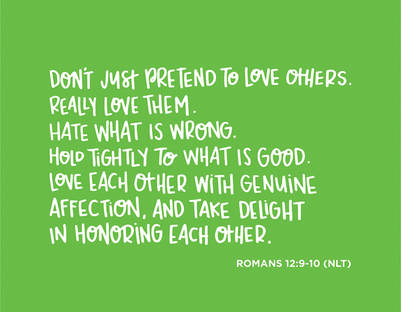 Romans 12:9-18 Love must be sincere. Hate what is evil; cling to what is good. Be devoted to one another in love. (Rom 12:9-10a) If we were to discern a theme for this Civic Service just by looking at the readings we could say that it is “Love”, and perhaps more to the point “neighbourly love”. As we read together these verse I am conscious that probably most of us hold quite settled and quite diverse ideas already about what love should look like, whom would be worthy of it, and how love ought to be expressed. Perhaps our own perceptions of love resemble more the one described in our reading from Ecclesiastes which speaks of love as something that has its appropriate time and place, and can be just as easily replaced by hate should the right circumstances arise (Cf. Eccl 3:8). Or maybe we still nurture in us an undying romantic spirit and we think of love in the same way St Paul seems to express it in the First Letter to the Corinthians when he says quite clearly ‘Love never fails.’ – or in other translations ‘Love never ends’ (1Cor 13:8). Everything else in all creation might pass away, but love will remain, and it could never be replaced by hate. So what is this love-thing the scriptures speak of? Our reading from Romans 12 is perhaps the best one to illustrate what love is, because it explains the meaning of love neither by contrasting it to hate, nor by painting an all too rosy picture of it, but by giving us a set of guidelines which describe how love should behave – or rather Romans 12 gives us clear examples of what people should do in order to genuinely love others. ‘Love must be sincere’ St Paul writes, or ‘Let love be without dissimulation’ (Rom 12:9a); which could be also translated as ‘Sincere love’ (maybe with an exclamation mark). And these two words form the heading for a series of instructions listed underneath. Yet, more than a “to do list” this reading is a charter, a mission statement, for those who love and there are many elements here that we can readily apply to our common life as fellow citizens of our town. ‘Hate what is evil’. Those who love are not asked to be pushovers or to turn a blind eye to injustice and wrong. Instead Scripture invites us to avoid the evils of our society in the same way we would avoid anything we deeply loathe. ‘Cling to what is good’. The words cling or cleave are not strong enough to illustrate the point Paul is trying to make. ‘Become glued to what is good’ might be a better way of putting it, because those who love others are not called to have pretty, well-meaning thoughts and leave it at that. We are called to pursue everything that is good (justice, integration, people’s welfare, religion) with our whole being. ‘Be devoted to one another’. The context here is family life and the domestic sense of care that each member of a family should have for the others; which means that those who love ought to consider other people as member of their own household, and therefore care for them accordingly. The list goes on, but we can get the flavour of it with these three short lines. The key point of Romans 12 is that love has little to do with cosy feelings, pink love-hearts, and butterflies in the stomach. Love is the constant and intentional pursuit of the good, honour, wellbeing, and encouragement of others. As such it should hold the highest priority among believers, and it should be at the heart of our civic life. Our neighbourhoods desperately need to hear this interpretation of love, when snobbery or rivalry between different parts of town risks hampering and fracturing the flourishing of our town. Our children should learn of it – value-focused schools especially should highlight love as that virtue which binds good habits such as respect, generosity, and forgiveness together. As adults we should strive to become role models of love; avoiding evil, injustice, crime, and wrong at all costs, and daily pursuing what is ultimately good and makes a positive difference in our common life. Love must be sincere. Hate what is evil; cling to what is good. Be devoted to one another in love. (Rom 12:9-10a) May God, who reveals himself to us as love, help and bless us in our pursuit for genuine love. Amen.
0 Comments
1 John 5:1-6
John 20:19-31 Who can overcome the world? Only the one who believes that Jesus is the Son of God: Jesus Christ who came by water and blood, not with water only, but with water and blood. (1 John 5:5-6) During Eastertide we begin the Parish Mass with the sprinkling with Holy Water which replaces the usual introduction and prayers of penitence. As we receive the water we are reminded of our Baptism and we sing praises to Christ, who says in John’s Gospel, ‘The water that I will give will become in [believers] a spring of water welling up to eternal life’ (John 4:14b). This rite of sprinkling is properly called the “Vidi Aquam” (Latin for “I saw water”) because the chant that usually accompanies it sings, ‘I saw water flowing from the right side of the temple, alleluia; and all they to whom that water came were saved, and they shall say, alleluia, alleluia.’ This chant and the sprinkling are clears echo of the words of the prophet Ezekiel which we read during the Easter Vigil where the prophet has a vision of the Temple at Jerusalem and says this, ‘there, water was flowing from below the threshold of the temple … south of the altar’ (Ezekiel 47:1), and that water brought life and healing to all. This idea of flowing, life-giving water finds its fulfilment on the Cross. The first three gospels describe the moment when Jesus died as the moment in which the curtain of the Temple is torn from top to bottom. As this barrier rips we can glimpse directly inside the sanctuary, inside the holiest part of the Temple, and look, as it were, upon God and his mercy. However, this dramatic moment is not reported be the evangelist John, who at that time was standing near the Cross of Jesus; instead he focuses his attention on something else; the piercing of the side of Jesus with a spear. For John this is the very moment when the true curtain of the true temple is torn. As the skin and flesh of Jesus are cut by the spear blood and water pour out, and here we can genuinely look upon God and upon his mercy. Time and again the gospels tell us that Jesus himself, his very body, is the true Temple in which we are able to encounter God – because in that body divine nature meets and joins our human nature. The Letter to the Hebrews testifies to this saying, ‘we have confidence to enter the sanctuary by the blood of Jesus, by the new and living way that he opened for us through the curtain (that is, through his flesh)’ (Hebrews 10:20). And as the spear cuts into the side of Jesus it is as if the tide of God’s mercy and love is released over the whole world purifying and giving life to all whom it reaches. This is the fulfilment of Ezekiel’s vision, and this is what our sprinkling during Eastertide celebrates. Rock of Ages, cleft for me, Let me hide myself in Thee; Let the water and the blood, From Thy riven side which flowed, Be of sin the double cure… This Sunday in particular, the second Sunday of Easter, is sometimes called “Divine Mercy Sunday” and, among other things, it leads us to reflect on the marks of the crucifixion, which the Lord Jesus bears of his body even after the resurrection. These are the “visible identification marks” by which the disciples are filled with joy in recognising the Lord, but more importantly, these are the points from which Divine Mercy streams for us, the springs of God’s love. Are we struggling with something? Let us look at those marks and see the wounds through which every strife has been overcome. Are we suffering? Let us approach those scars which have inflicted a fatal blow to every sorrow. Are we weighed down by guilt or feeling undeserving of love? Let us approach those marks which have brought us divine mercy and love. Jesus said to Thomas: ‘Give me your hand; put it into my side. Doubt no longer but believe.’ (John 20:27b) The apostle Thomas approached the marks of Jesus’ passion as a way of testing the Lord, but just by seeing them he was restored to faith. We should approach them with full trust in Jesus, knowing that it is through those wounds that we are saved. Blood of my Saviour, bathe me in thy tide, wash me with water flowing from thy side. …deep in thy wounds, Lord, hide and shelter me, so shall I never, never part from thee. 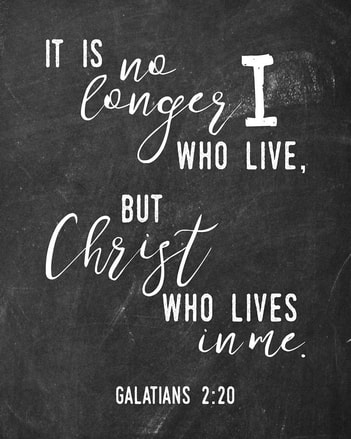 1Peter 3:18-22 ‘Christ himself, innocent though he was, had died once for sins, died for the guilty, to lead us to God.’ (1Peter 3:18) Lent has been, from its beginning, the time in which catechumens, the candidates for Baptism, prepared to be welcomed in the Church at Easter. And on this first Sunday of Lent our readings lead us to consider this sacrament as the beginning of the new life we share as Christians. Our second reading compares the sacrament of Baptism to the time when God saved Noah and his family in the ark, and gave them new life in the world he has cleansed from evil through the great flood. So too, at our Baptism the Cross of Jesus was our ark, and God saved us through waters of the font, giving us new life – but not new life in a world purified from evil as in the times of Noah, rather new life in his Son. Since our Baptism the life of Christ has been grafted in us and we have become part of that new creation God brings about in and through the Lord Jesus. This is why Saint Paul writing to the Corinthians says, ‘if anyone is in Christ, there is a new creation’ (2Corinthians 5:17). So Lent should teach us that, if we are receptive to the grace of God, this new creation, this new life, will keep growing in us, transforming us into ever better likenesses, images of Jesus. Many aspects of Lenten liturgy (the colour purple, the sombre hymns, the silencing of the alleluias) call us to think about our failings asking God’s forgiveness for our sins and strength to rectify, if possible, our wrong decisions. But this is only the beginning of our Lenten journey; because essentially these forty days are given to us by God and by the Church to re-establish more firmly the life of Christ within us. We are not meant to metaphorically sit on a pile of ashes wearing sackcloth for six weeks feeling sorry for ourselves but actually do nothing to reverse our condition… Lent is a time to be active in the spirit and in the service of others. There are various schools of thought about Lent and about what one should or shouldn’t do during this season. The Church of England, being a broad church, keeps it nice and loose telling us that this should be a time of self-denial. But the substance of the matter is that the time-honoured practices of fasting, almsgiving, and prayer can be the source of great and unnumbered blessings as we enter the mystery of the Lord’s Passion, Death, and Resurrection and we prepare to renew our Baptismal commitments Easter. Through fasting, abstinence from certain foods, prayer, and charitable giving we do not exercise self-loathing or try to reproduce what Jesus went through on Calvary in some measly way. This should be quite clear to everyone – even though people outside these walls might make fun of the whole Lenten enterprise, or think of us a bit dim for denying ourselves things we like. Rather, by fasting and abstinence we aim to refresh the spirit and focus on our spiritual needs; by deeper prayer we aim to reconnect more clearly with Jesus; by giving to charity we aim to imitate the generosity of the Lord himself. And through all these Lenten practices together we aim to free ourselves of those old habits that have taken hold on us; we aim to spiritually die to sin in order to give space for the life of Christ to grow vigorously once again, until we can say with Paul, ‘it is no longer I who live, but Christ who lives in me’ (Galatians 2:20). There is a beautiful hymn, “And now, O Father, mindful of that love” which puts these thoughts about being one with Christ in a neat verse. It says, Look, Father, look on His anointed face, And only look on us as found in Him; Look not on our misusings of Thy grace, Our prayer so languid, and our faith so dim; For lo! between our sins and their reward, We set the passion of Thy Son our Lord. Through Baptism we have become one with Christ. Lent calls us to make a genuine effort to move beyond ourselves, to rediscover our Baptism to find ourselves, our true identities, in Christ – in the one who leads us to the Father. 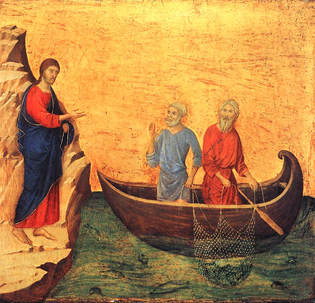 Mark 1:14-20 ‘The time has come’ he said ‘and the kingdom of God is close at hand. Repent, and believe the Good News.’ (Mark 1:15) One of the most annoying things a satnav can say is, “Use the next roundabout to make a U-turn.” Unfortunately, it is also something that I hear often. And if you’re anything like me, you would find it rather frustrating precisely because there, in the middle of your plodding along and trying to find your way through the traffic, the satnav suddenly reminds you that something has gone wrong – heck, not something, but that you have gone down the wrong road – and that only possible way to reach your destination is to turn around immediately and go back to the appointed route. Today’s gospel – and first reading for that matter – does precisely that, as we hear the Lord Jesus saying, ‘Repent, and believe the Good News.’ To repent literally means to turn around. To repent is to turn around and away from what we are doing, and to re-orient ourselves toward Jesus. Just as at Mass we all orient ourselves in one and the same direction towards the Lord present on the altar, so we are called to do in life, as Jesus invites us to make a U-turn from our self-centred, self-seeking (and sometimes self-destructing) ways, and start to follow after him instead. Simple enough to say, but what does repentance actually look like in practice? Perhaps unfortunately, repentance has been badly typecast, and I guess most of us would associate it with doing penance, with giving up things for Lent, with fasting and putting on sackcloth like the citizens of Nineveh, and even with a time of boring, joyless sobriety. But all these things are just tools to lead us to true repentance, which is simply a genuine movement of both heart and mind towards Christ… the start of a journey in his direction. Mark’s gospel gives us a practical example of what repentance should look like by describing how the first disciples begin to follow Jesus. Last Sunday we read together a passage of John’s gospel where Jesus is manifested by John the Baptist as the Christ. In that version of the events, John and Andrew immediately start to follow Jesus after that testimony. But Mark presents us with the different version of the events, where it is Jesus who calls Peter and Andrew, and then James and John to follow. So which one was it? Which version of the events is more likely to be a true account of what happened when the first disciples encountered the Lord? I personally would suggest that John’s description of how him and Andrew begun their journey with Jesus is probably the more accurate, because John the Evangelist was actually one of the people involved. However, there is no need to set one version against the other, because they both agree in putting the same two points across. First, Jesus is this hugely charismatic and compelling figure and whether his call to them was individual and explicit or not, the disciples are instinctively drawn to him, to attach themselves to him. Secondly, to follow Jesus means repenting; turning away and leaving one’s life behind in order to be with the Lord. And this aspect is more prominent is Mark’s version. See how Peter and Andrew are surprised by Jesus in the middle of their working day, and how James and John are called by the Lord in the ordinariness of their daily routine... When the Lord calls them, it’s not like they don’t have anything else to do. As fishermen they own their own businesses, so to speak; they have families to provide for and things to do. Yet, all of them turn away from what they were doing, because they can instinctively see that to follow Jesus is far more important than anything else. So without a word they make their first steps in a new direction, in a new life. And for them this is the beginning of true, life-long repentance. It is never easy to realise when we are going wrong, to eat humble pie and to make a U-turn. But if we carry on and let ourselves be guided by social conventions, bad habits, unfulfilling occupations, or human values with very little meaning, our journey through life can easily become an aimless (if not disastrous) wandering along unsuitable roads. Yet, turning around is always possible and well worth the effort; to repent and accept the gospel is to make the first steps is a new direction toward something different, something better, and something altogether more satisfying. John 1:35-42
‘Andrew met his brother and said to him, ‘We have found the Messiah’ and he took Simon to Jesus.’ (John 1:41-42) The Sunday readings between the Feasts of the Epiphany and Candlemas present us with a number of other epiphanies, other moments in which Jesus is revealed as the Messiah, the Christ. Last week a star led the Wise Men to the Lord and they adored him as “King, and God, and Sacrifice”. Today John the Baptist and the Apostle Andrew are among the first to lead other people to Jesus – not coldly and from a distance like the star did, but in a warm and personal way. Andrew and the beloved disciple John are the first to become disciples of Jesus after John the Baptist revealed him as the Saviour, the ‘Lamb of God’ (1:35). As Jesus sees the two men literally walking behind him, he says to them, ‘What do you want?’ Jesus didn’t expressly invite them to follow him, so his question might seem entirely reasonable, if a little abrupt. But Jesus implies something more meaningful; “What is it that you actually want? What are you searching for?” And when they tell him, Jesus invites them to become his disciples with a very simple invitation; ‘Come and see’ (1:39). “Come and see where I live, the way I live” the Lord seems to say, “and stay with me as long as you wish.” Then it is Andrew’s turn to reveal Jesus as the Christ to someone else. He finds his brother Simon and leads him to Jesus after announcing to him, ‘We have found the Messiah’ (1:41). We are not told Simon’s feelings about being taken to meet Jesus; maybe he goes with Andrew out of politeness, maybe he is just curious, but one thing is certain; Andrew’s words change his brother’s life forever, so much so that Simon is even given a new name by the Lord; Peter. After this, the series of revelations and invitations to follow Christ continues, even though our gospel reading today ends with the joining of Peter. A couple of verses later, it is the turn of another disciple – this time Philip – to go to Nathanael (one of his friends) and to say to him “We have found the Messiah” (Cf. 1:45) followed by the simple invitation first extended by Jesus; ‘Come and see’ (1:46). John the Baptist, Andrew, and then Philip give us examples of what to do. They all led someone to Jesus, but not someone at random – Andrew and Philip especially did not stand on street corners talking about Jesus like the preachers one finds on Oxford Circus. No. John the Baptist, and Andrew and Philip led to the Lord people whom they already knew; a friend, a family member, a companion… Their invitations were warm and personal, and so should ours be. But where does this leave us? When I was young my parish priest quite often used the same refrain at the end of a poorly attended service, “Next time” he would say, “if we each invite someone else – a member of our family or a friend – there’ll be a few more of us at Mass”. And this is what today’s gospel invites us to do as well. We are called to act like John the Baptist, Andrew, and Philip. Our common vocation is to reach out, to our family members, friends, and neighbours, showing them something about the joy of having found Christ. We are called to invite the Simons and Nathanaels of our times to “come and see” the Lord Jesus present in our midst, “come and see” how his presence reshapes our lives; “come and see” how he teaches us ways of justice and love. ‘Come and see’ is an open invitation to join that community that the Lord calls “his church” (Cf. Matt 16:18), because it is this unique gathering of extremely different people that Christ has chosen to be a continual epiphany, a constant manifestation of his presence in the world. 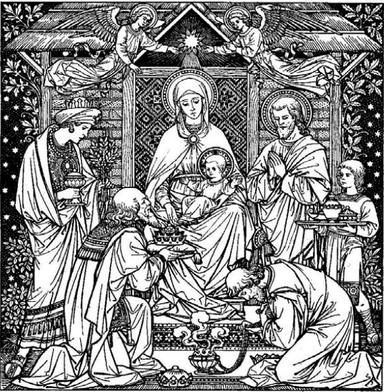 Matthew 2:1-12 ‘…falling to their knees they did him homage. Then, opening their treasures, they offered him gifts of gold and frankincense and myrrh.’ (Matthew 2:11) The story of the Magi has captured the imagination of countless generations of Christians, and why wouldn’t it? The Wise Men appear mysteriously on the scene lead by a star; they turn up to the house of the Holy Family unannounced; they bring with them precious gifts, they worship Jesus as Saviour and God, and then they leave as quickly as they arrived… Rivers of ink have been spilled about these star-gazers from the East, and there is so much we could talk about after reading their story. But perhaps the most important thing we can do this morning is to travel in spirit to Bethlehem with the Magi, and to learn something about worship from the way in which they greet the Christ-child and the gifts they bring. We read that the Magi ‘fell to their knees’ – or as the Greek text puts it, they prostrated themselves before the Christ-child. This is the way people acknowledged the presence of God in ancient times, and the way in which followers of other religions still worship now. Yet, we seem to suffer with stiff knees, don’t we? And when we cannot avoid kneeling we do so begrudgingly. Yet, the Wise Men teach us that kneeling in prayer and greeting the Lord is this way is an act of devotion, of love, which – if we are able – we should imitate. The Magi offered gold. Tradition associates this gift with the Kingship of Christ, because in ancient times only rulers and members of royal households could afford to wear gold, and only the palaces of kings or the temples of the gods could be decorated with it. But there is more. Gold was also a currency – as it still is today, and in offering it to Jesus the Magi offered financial support to the Holy Family who found themselves far from Nazareth, and on the brink of a perilous journey into Egypt. It is as if by worshipping Jesus with gifts of gold, the Wise Men were the first to put into practice the commands Jesus will give to assist those in difficulty. Likewise, the gifts we ourselves offer to the Lord – both to make his house a beautiful and resplendent place fit for the King, and to lift the poor out of misery – are an essential part of the Christian life. And the Wise Men teach us that giving is an important aspect of the way we worship God. The Magi offered frankincense. Tradition associates this gift with the Divinity of Christ, because in ancient times incense was offered only to the gods. In the Jerusalem Temple an altar was dedicated to this purpose alone, and in the house of Bethlehem the Magi offer incense to the Christ-child, to our God-made-flesh. Likewise, the incense we offer in this place (and more generally the beauty and the ritual of our liturgy) is part of the Christian life. The Magi offered myrrh. Tradition associates this gift with the Passion and Death of Christ, because in ancient times myrrh was often used to preserve the body from the effects of death and stay its decay. And in this sense it is a gift we cannot offer to the Lord anymore, because he has risen from the dead and death does not have power over him. But there is another meaning behind this gift. Myrrh was mixed with oil for anointing and consecration, so through their gift the Magi honoured the Lord Jesus as the Eternal High Priest who sacrificed himself for us. We too have been anointed with oil mixed with perfume at our Baptism and Confirmation, then – like myrrh – our life are ought to be a fragrant gift to God through the Lord Jesus . ‘…falling to their knees they did him homage. Then, opening their treasures, they offered him gifts of gold and frankincense and myrrh.’ (Matthew 2:11) We may not be able to follow a star to Bethlehem like that Magi, but every time we approach the altar we too come into the presence of the Lord Jesus, so our worship and love of him should be inspired by theirs. These mysterious travellers teach us that the worship of Christ is something beautiful and all-encompassing; including our emotions, our senses, our posture, and our possessions. Or as a Passiontide hymn puts it, Were the whole realm of nature mine, that were a present far too small. Love so amazing, so divine, demands my soul, my life, my all. 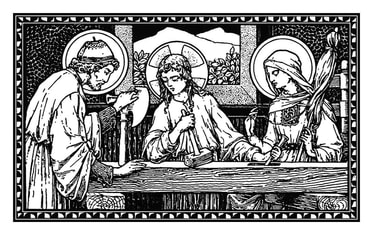 Luke 2:22, 39-40 ‘The child grew to maturity, and he was filled with wisdom; and God’s favour was with him’ (Luke 2:40) I chose to read the shortened version of our gospel this morning for two reasons; first we are going to encounter this passage again in a few weeks’ time at Candlemas, and secondly, the main point Luke wants to make this morning is that Jesus, the eternal Son of God the Father, grew up and was formed in a human family – that Holy Family. Today’s celebration can teach us something about our faith. Falling on the Sunday in the Octave of Christmas, the Feast of the Holy Family is a natural extension of Christmas Day itself, the next step in unfolding the mystery of the Incarnation. God the Son chose to become “God-with-us”, he chose to become incarnate in Mary, he chose to be born in humble conditions; then he also chose to grow up as children do within the ordinariness of a human family. In this Holy Family, God humbled himself to learn obedience to earthly parents and how to relate to other people. Why? In his loving purpose to redeem us in Jesus Christ, God assumed our flesh, our nature, and all the triviality of our being human; so he assumed also the tricky dynamics of human relationships, including family life. So in honouring the Holy Family we see how Jesus redeemed everything about our lives, even our sometimes dysfunctional families, showing us a better way, a holy way, to be family… A better way to be family… These are loaded words. I understand it. And on this feast there is always a strong danger for preachers to hold up the Family of Nazareth as the divine blue print for the ideal set up of a Christian family – mummy and daddy are happily married, and their child is so adorably well-behaved that even a carol sings “no crying he makes”. I say a danger because a family so idealized could be a stumbling block for many of us, rather than an inspiration. Besides, in practice families don’t always work like that, and our domestic arrangements are, more often than not, rather more complicated that the ones faced by the Holy Family, even with all their travels as refugees, and their having to lodge in a stable – mummy and daddy are not necessarily happily married, or together at all, and sometimes the children can be a bit of a handful to say the least. So, what would the Feast of Holy Family teach us, teach our families, today? Rather than a blue print for our domestic set up they can become a spiritual model for our families in the sense that in the home of Nazareth we see an “authentic school of the Gospel” (JPII & Francis, Angelus Messages on 30 Dec 2001 & 27 Dec 2015), where Mary and Joseph, gathered around the living Word of God, lead their household in a way that is intentionally centred on faith and commitment to God. We must look beyond the very unique features of the Holy Family’s domestic arrangements to see how Jesus, Mary, and Joseph can teach every home to be or become a “domestic church” (Lumen Gentium)– a community where the Christian habits of love, faith, and hope are practiced and taught; a haven of unconditional affection, a place where – as the introduction to the wedding service says – ‘each member, in good times and in bad, can find strength, companionship and comfort, and grow to maturity in love.’ May the prayers of the Holy Family help us to put God at centre of our homes, and gain for us the grace we need to imitate their devotion to one another in our relationships. Amen. 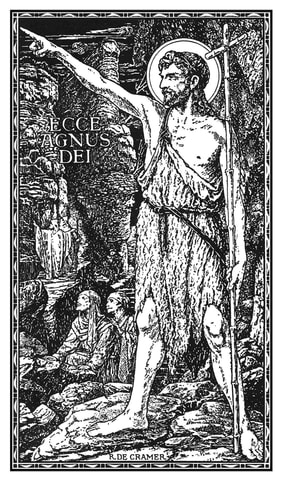 John 1:6-8, 19-28 ‘He came as a witness to speak for the light’ (John 1:7) Yesterday afternoon we celebrated the first of our Christingles; earlier this morning we have lit the third candle on the Advent Wreath; and tonight we will come together for our service of Carols by Candlelight. All these liturgies place a very strong emphasis on the belief that Jesus is the Light of the World – a light which darkness cannot overcome (Cf. John 1:5). And as with our candles (in our hands, on top of our oranges, or on the Advent Wreath) we scatter the darkness that surrounds us, we remind ourselves and the world that only through the Light of Christ we are able to see clearly. These candles – whether wonky, propped up with tin foil, or blessed – are only a token witness to that bright, unquenchable, searing, and cheerful light that is Christ. And today’s gospel presents us with an even better example of what it means to be a witness to Jesus as the Light of the World. St John the Baptist was unquestionably a peculiar figure by any standard. As we heard last week, he wore clothes made of camel’s hair, he fed on insects and wild honey, he was often rather forthright in his speech, and although he lived in the desert he attracted a huge number of people who wanted to be baptised by him. But, what we should find even more remarkable is the way in which we are introduced to him by John the Evangelist. A man came, sent by God. His name was John. He came as a witness, as a witness to speak for the light, so that everyone might believe through him. This description of John the Baptist is an integral part of the gospel’s first few verses where Jesus is proclaimed as the Word of God, the Light of Life, and the Light of the World. And John’s ministry – in fact his whole life – was so intertwined with Jesus’ that the evangelist has to specify that John the Baptist ‘was not the light, only a witness to speak for the light’ (John 1:8). Like Moses, Isaiah, and the other prophets, John was sent by God to point the way to the Messiah, and to bring a testimony about the true Light which was about to be revealed to the world in the person of the Lord Jesus. But, as the last of the prophets, as a cousin of Jesus, and as a peculiar figure, it would be easy to look past John the Baptist and to think that he had nothing to teach us. Yet, I strongly believe that this short description of John could and should be a fitting description for every Christian – if we only let our lives become so intertwined with the life of Jesus that others would find it difficult to separate our character from his. A man came, sent by God. His name was John. He came as a witness, as a witness to speak for the light, so that everyone might believe through him. Like our candles we might be a bit wonky in our religious life (maybe not propped up with tin foil and stuck in an orange), but we are all, every one of us, most certainly blessed, and so like our candles we have to bear witness to Jesus as the Light of the World. Then, how good it would be if people were to say of us, “There was a man (or woman) sent by God. His name was … He came as a witness, as a witness to speak for the light, so that everyone might believe through him”? How good would it be, if with our simple faith we could bring the light of Jesus to others, so that those around us might have faith through us? John the Baptist led a rather odd life, but we do not need to move to the wilderness, and star eating insects, to bear witness to the Light of Jesus. We just have to put into practice the simple advice found in our second reading; ‘Be happy at all times; pray constantly; and for all things give thanks to God’ (1Thess 5:16). Our society, perhaps now more than ever, needs happy and positive people whose joy comes from knowing Christ; it needs people who take prayer and the sacraments seriously; and it needs people who know how to be grateful to God for the innumerable blessings we receive from his hand… If we do this, we will be not only genuine Christians, but we will set the world alight with the true Light that is Christ the Lord.  Matthew 25:14-30 Well done, good and faithful servant; you have shown you can be faithful in small things, I will trust you with greater; come and join in your master’s happiness. (Matt 25:23) On Friday I paid a short visit to the church of Christ the King, Gordon Square, in London – and if you ever find yourselves at loose ends in Bloomsbury, I encourage you to do the same as it is a masterpiece of English gothic revival. This church was built by the Catholic Apostolic Church, which was a Victorian religious group (with very little to do with the Church of England, or with Roman Catholicism) that emphasised the second coming of Jesus – in fact members of this church, genuinely expected Christ to come in glory at any moment and they forecasted it to happen in their lifetime. Rumours even have it that in the vestry of this church the best set of vestments was always laid out on the vestment press, ready for the Lord to wear them at his coming. We may find this custom amusing, or even outlandish, but perhaps it should prompt us to reflect on how we relate to Christian belief in the second coming of Christ as sovereign Lord and judge of all creation. Faith in the second coming is often misrepresented by both Christians and non-believers alike, and it may even seem out of place when we think that scientists can now calculate the life expectancy of stars. Yet, the Creed we say together affirms that Jesus ‘will come again to judge both the living and the dead’. The theme of Jesus’ return is embedded in today’s parable of the talents – indeed, it is the dominant feature of Matthew 24 and 25. And here we read that, at his coming, the Lord will reward those who to have faithfully invested their talents, whilst he will reject from his presence those whom failed his trust. Then, our faith in the Lord’s return should lead us to see ourselves as the characters of the parable, as the servants whom the Master entrusts with a lavish array of talents from his own fullness. In Jesus’ time a talent was an enormous sum of money; it corresponded to the wage for over eight years of work – if not more. But in the parable, talents represent more than just money; they are a symbol of the extraordinary number of flairs and abilities God freely bestows on each one of us. And regardless of whether we see ourselves in the servant with five talents, or in the servant entrusted with one, all we need to recognise is that God has, in fact, given us much… No-one among us here – in fact, I go as far as saying no human being – is deprived of at least a special quality, a something, they can invest to the glory of God – we just need to be able to recognise what has been given to us, and put it to its best possible use. But what could our talents be? Do you have free time? Offer it to the Church, or spend it in prayer for others. Do you have a lively faith, or delight in learning about God? Encourage those whose faith is weak. Are you an artist? Say something about God with your art. Do you have administrative skills? There are plenty of churches who need your help. Do you have money or wealth? Give what you can. Do you have musical skills? Join the choir. Do you have a vocation to ministry? Devote your life to it. Are you outgoing and cheerful? Befriend the lovely. These are just examples, but they give us an idea that almost everything can be used to glory of God, and that we are charged with this task. So, what impact should the parable of the talents and our belief in the second coming have on the way we live? And what should we do so that the Lord may say to us, “Well done, good and faithful servant”? The answer is rather simple; whilst people outside these walls would use everything in their power to advance their position in society or to gain fame and wealth, we, as Christian, should use everything we have received from God so as to further his glory. Only then we can hope to enter the master’s joy, the joy of heaven, and be admitted into the Lord’s presence. Once saw a fridge magnet at a friend’s vicarage that read, “Jesus is coming. Look busy!” And I guess there is a little bit of truth in this. Our faith teaches us that Jesus will indeed come again. But, even though Christians have often tried to forecast his appearing, today’s parable remind us that the point of our faith is neither to determine an Estimated Time of Arrival for Jesus nor to pretend to be busy; rather faith should make us faithful and diligent in working for him. Matthew 23:1-12
Jesus says, ‘you have only one master, and you are all brothers.’ (Matt 23:8) The Bible texts we have just read, with their references to priesthood and teaching ministry, are sadly not the texts used at ordinations within the Church of England. Maybe this is a missed opportunity for checking, at the eleventh hour, that the candidates standing before the bishop truly understand what they are letting themselves in for. But I suspect that introducing these texts might also lead to an increase in the numbers of last-minute drop outs. In today’s gospel, we see Jesus criticising once again the religious elite of his time as we have seen him doing many times already in the last few weeks. These people, and especially the scribes, were considered the official interprets of the Law, of the Scriptures, and because of this they could claim for themselves position of power in Jewish society, the respect and admiration of everyone, and they could also express judgment – often harsh judgment – on the morality of others. And so the Lord reproaches them because they exalted themselves above fellow Israelites, because they themselves failed to live up to the high standard they set for others, and because through their strict teachings they caused people to stumble in their faith (cf. Mal 2:8). The Church too does not have good track record on this issue. History records countless times when individuals charged with the governance of God’s people have abused their positions of authority, promoted moral double-standards, and failed to care for the flock of Christ. So both the Lord’s criticism to the scribes and Pharisees, and the prophecy of Malachi in our first reading, still ring true today. Yet, the Lord’s teaching is not directed to the scribes and Pharisees, or priests and theologians, alone; it is aimed to all his disciples and the crowds as well. This is because the point Jesus is trying to put across is not a subversive message against the entire religious establishment, but against those who misuse religion for personal gain, to acquire for themselves moral high ground in every situation, and to conquer the respect of others. The point Jesus wants to understand is this ‘you have only one master, and you are all brothers’ (Matt 23:8). If we excuse the gender exclusive language, Jesus is saying that we are all equal before him, and all equal before the Father in heaven. Jesus does recognise that there are people called by God to positions of authority and by saying, ‘You must therefore do what they tell you and listen to what they say’ (Matt 23) he invites everyone to respect their ministry and, if possible, to learn from them – even when these prove themselves to be wanting in the way they lead their lives. Within our Christian family there are those who have special responsibility, people entrusted with a duty of care, but this does not change the fact that we are all fundamentally siblings – beloved children of God by adoption whom the Father sees as equal members of the body of his only begotten Son Jesus Christ. In this sense, when Jesus commands us to call no-one father or teacher he wants us to reflect on what those titles mean. This is not a blanket ban on using the words “father” and “teacher”. Jesus is not saying that to call a priest Father is wrong, like many evangelicals would have us believe. In ancient times fathers had the ultimate say in everything – even life or death – for everyone in their household, they could even sell off their children. Teachers too could be harsh masters of their pupils. So Jesus says, no-one but God should have this level of authority over anyone of us, because we are all brothers. The words of the liturgy help us understand this better. However we refer to our priests in terms of titles – Father, Reverend, Mother, Vicar – at the moment in which the offerings of bread and wine are placed upon the altar, the celebrant says, ‘Pray, my brothers and sisters, that my sacrifice and yours will be acceptable to God, the Almighty Father’. As the liturgy of the sacrament enters into its most profound part, the balance between congregation and priest, the balance among the people of God, is redressed to highlight the fact that actually “we are all brothers and sisters” before God the Father. The ground-breaking teaching of today’s gospel is not “don’t call anyone father or teacher” but is ‘you are all brothers and sisters’ before God. And, as our society appears to become more and more fragmented, more and more divided by the partisan language of “us” and “them”, the Lord’s commands us to rediscover what it means to be part of the same family, the same household of God. |
Archives
June 2020
Categories
All
|
 RSS Feed
RSS Feed


